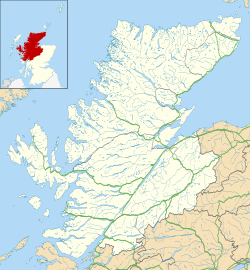Toulvaddie
| |
|---|---|
Location within the Highland council area | |
| OS grid reference | NH900808 |
| Council area | |
| Country | Scotland |
| Sovereign state | United Kingdom |
| Postcode district | IV20 1 |
| Police | Scotland |
| Fire | Scottish |
| Ambulance | Scottish |
Toulvaddie (Scottish Gaelic : Toll a' Mhadaidh) is a hamlet, in the Tarbat peninsula, located in Tain, Ross-shire, Scottish Highlands and is in the Scottish council area of Highland.
